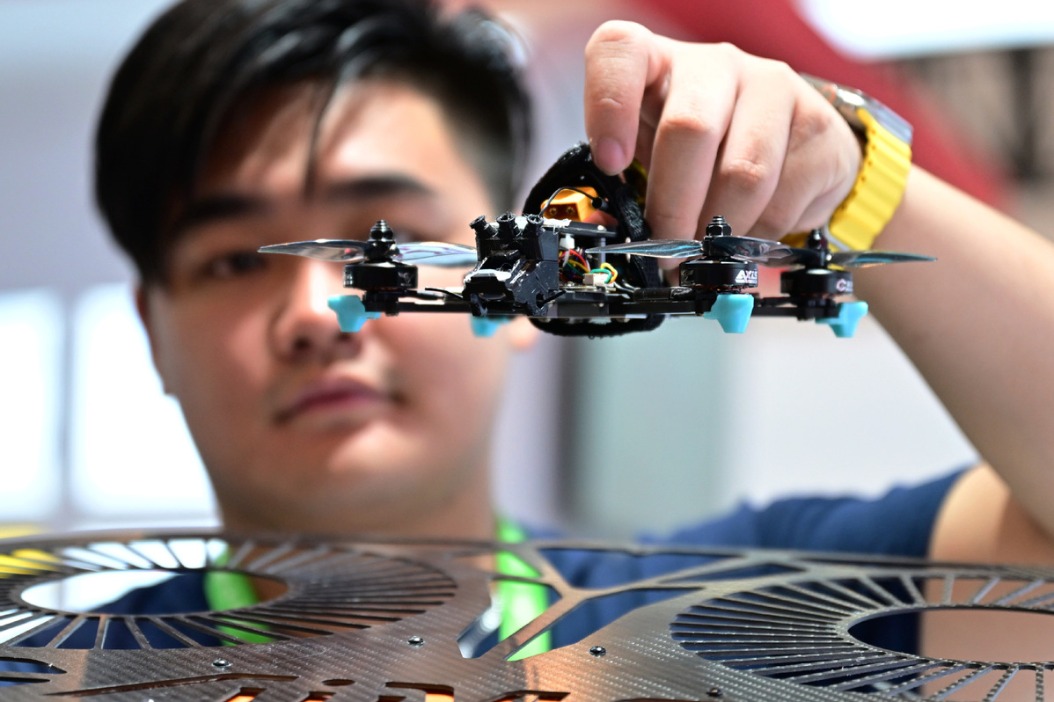Entrepreneur's 'AI teacher' does the math

A typical Chinese high-school classroom features students sitting behind desks carrying piles of exercise books, busily answering one question after another.
Xu Anbang, a 29-year-old entrepreneur, was one of them when studying in high school. "I studied until 11 o'clock in the evening every day before the college entrance examination." He recalled all students followed teachers' instructions to do the exact same exercises.
But he believes the method is not efficient and sometimes a waste of time because the same question may be difficult for one student but easy for another.
Aiming to realize customized learning content, the young man started the firm Symbol Tree in Shenzhen last year, after studying and working in the United States for six years, including at the research center in Apple's headquarters in California.
His solution is to utilize artificial intelligence to find the reason for students' mistakes with series of customized exercises and provide related material to help improve this point of knowledge, so they could quit the "excessive assignments tactic".
For example, if a student often makes mistakes about solid geometry, the "AI teacher", as Xu calls it, will analyze the reason for these mistakes. The reason is likely to be unfamiliarity with algebra or poor space-imagination ability; the AI teacher then provides teaching video clips or other interpretations accordingly, instead of just throwing out more solid geometry exercises.
But he admitted the system needs 10,000 to 20,000 students' continuous usage data to present an accurate result.
"It is like AlphaGo (a computer program that plays the board game go). It can learn by itself with more and more data," he noted.
So far, the startup has collected the data of 1,000 students in cooperation with high schools and education institutions in Shenzhen, Zhanjiang and Huizhou in Guangdong province. It focuses on mathematics at present and plans to expand to other subjects in future.
"The idea is to set up a network of knowledge for each student by seeking their 'blind spots' and filling them in," the entrepreneur pointed out.
He emphasized the technology is not to replace human teachers, but to help them. "High-quality teaching resources are unequally distributed, not only between villages and cities but even within the same city", and he has dedicated himself to improving the situation with technology.
Last year, the startup was selected to be incubated in the Qianhai Shenzhen-Hong Kong Youth Innovation and Entrepreneur Hub and, in February this year, it received angel funding worth millions of yuan from Fortune Capital, one of the earliest market-oriented venture capital firms on the Chinese mainland.
Online education has become one of the most popular industries with investors and their money since last year, said Liu Jiehao, analyst at internet consultancy iiMedia Research Group.
The research center said in a report that the mainland's online education market reached 281 billion yuan ($33.4 billion) in revenue last year and is expected to exceed 348 billion yuan this year.
The K-12 education, drawing on the North American designation for students from kindergarten through the 12th grade, in particular, is estimated to achieve approximately 20 million online users this year.
The report also found 36.6 percent of users surveyed are willing to pay 101 to 200 yuan a month for K-12 e-learning products.
The penetration rate is merely 11.6 percent and there is still great potential for development, Liu reckoned. But he pointed out that many online education brands such as VIPKid and DadaABC are booming, leading to fierce competition in the market.
However, in the field of mathematics, which Xu's startup concentrates on, there are relatively fewer competitors, as almost half of the e-learning platforms currently focus solely on English study.
Liu believes empowering online education with AI technology is going to be a trend in the long run. "The AI technology could better understand students' learning status and characteristics to provide customized training, but the key to increasing competitiveness is to invest more in technology upgrading," Liu said.
Contact with the writer at grace@chinadailyhk.com




































